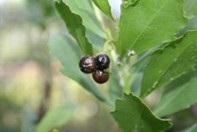Weed of the month
WEED INDENTIFICATION
Boneseed
(Chrysanthemoides monilifera subsp. monilifera)



What does it look like?
Boneseed is an erect, woody, perennial shrub which grows up to 3 m high.
Leaves are oval shaped with irregular toothed edges and are 3–9 cm long
Flowers are yellow daisy-like flowers with 4–8 petals. They are in clusters at the end of branches
Fruit are round, green and fleshy when young and then black when mature
Seeds are whitish, bone-coloured when dry and smooth and round
Stems are woody, branched and upright
Where is it found?
Boneseed grows throughout southern Australia. Boneseed has been found in most local government areas in the Greater Sydney region.
There are also many infested sites in the South East region. There are scattered or isolated infestations in the Hunter, Murray, Riverina and Western regions
The Boneseed plant is native to South Africa.
What type of environment does it grow in?
Boneseed prefers regions with winter rainfall and grows best on sandy or medium-textured soils. It tolerates salty conditions and can thrive on the coast but does not tolerate water-logged soils.
It is not usually a problem on agricultural land because it is easily suppressed by grazing and cultivation.
Control
Your local council weeds officer will assist with identification and information on control, removal and eradication of this weed. Infestations can be spread by inappropriate control activities.
To manage boneseed:
- control mature plants to limit seed production
- check for regrowth and new seedlings
- kill young plants before they are 1 year old to prevent seed set (most plants do not flower until 18 months old)
- keep checking for new seedlings each year because seeds can be dormant in the soil for up to 10 years.
- Physical removal by
- Hand, machine, sheep grazing, slashing, mulching, fire, chemical control
For further advice and assistance with information, select the link and visit
https://weeds.dpi.nsw.gov.au/Weeds/Boneseed
Or please contact our weed control team at compliance@berriganshire.nsw.gov.au
Note: This information has been provided by the NSW Government DPI